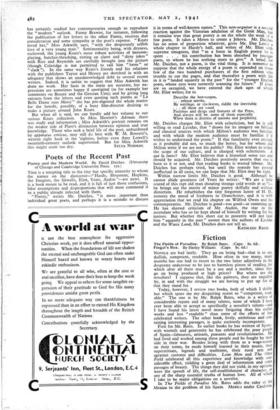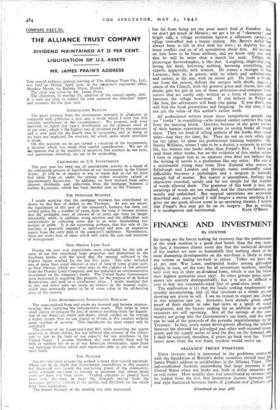Fiction
NOVELS are bad lately. They go on being bad—that is to say, dullish, competent, readable. How often in too many, many months has one had to resort to the two latter adjectives in the desperate endeavour to be just to harmless pieces of reading, for which after all there must be a use and a market, since they go on being produced at high prices? But where are the novelists? I suppose that, like the painters, they are engulfed by, in and with the struggle we are having to put up for all that they stand for. Today, however, I review two books, both of which I dislike but which spare me my despairing resort to " competent, read- able." The one is by Mr. Ralph Bates, who is a writer of considerable repute and of many talents, none of which I have ever been able to accept as specifically a novelist's talents--and I have found his latest novel more fatiguing than his earlier works and less " readable " than some of the efforts of less celebrated writers. The other book, lively, ambitious and con- taining interesting passages, is quite curiously incompetent. First for Mr. Bates. In earlier books he has written of Spain: with warmth and generosity he has celebrated the poor people of Spain—labourers, artisans, peasants and revolutionaries. He had lived and worked among these people and he fought by their side in their war. Besides living with them as a wage-earner on their terms, he made himself learned in their music, their superstitions, legends and traditions, their rural arts and agrarian customs and difficulties. Lean Men and The Olive Field celebrated all this experience and knowledge with con- siderable effect, yielding a great deal of information and some passages of beauty. The things they did not yield, in my opinion, were the speech of life, the self-establishment of character, or any of the sharp essential truths of human love. All of which I take to be major obligations on a novelist. In The Fields of Paradise Mr. Bates adds the rider of his Mexico to the problem of his Spain. Mexico under Cardenas, but far from being yet the poor man's field of Paradise. But we don't get much of Mexico ; we get a lot of " character " and bright talk, a village revolution against a villainous cacique, a village love-affair and a happy ending. Mr. Bates's defect has always been to fall in love with his hero ; to deprive hire of inner conflict and us of all speculation about him. All assaults on him have to be from without, and we know only too well that he will be more than a match for such. Felipe, the picaresque fireworkmaker, is like that. Laughing, thigh-slapping, loving his kind, believing nothing, knowing everything, and superb, apparently, with women. He comes a stranger to San Lorenzo; in, in prison, with its rebels and unfortunates, and earlier, at the inn, with its nicest girl. He leads a break. out from the prison, defeats the cacique with death, argues a canon of the Church, with the greatest grace and charm, into self- doubt, gets his girl in one of those protractor-and-compass love- scenes that are surely only written as a form of exercise, and becomes the village head-man. If you believe in Felipe or like him, the adventures will keep you going. If you don't, you will find the book pretentious and fatiguing. In any case, it has not got the value of this author's earlier work.
All professional writers know those sympathetic people who see " books " in everything—who indeed cannot subtract the book from the running brook. Doctors, because of the great variety of their human experience, are prone to seeing books all round them. They are fond of telling authors of the books they could write—had they the time, &c. They do not so very often sigh for the talent, let alone the professional training requisite. Mr. Harley Williams, whom I take to be a doctor, a surgeon, in private life, has written two books other than Fingars Box. I have not read these other works, but on the evidence of this under review I have to regard him as an amateur who does not believe that the writing of novels is a profession like any other. His tale of a sentimental young man from New Zealand who comes to Edinburgh and London and through many confusedly stated difficulties becomes a pathologist and a surgeon is naturally enough full of matter. But matter is amorphous, feelings and characters crowded, untidy and far too simple for the number of words allowed them. The grammar of this book is bad, the meanings of words are not studied, and the characterisations are woolly and unfinished. But surgical operations are accurately described and, since myself I will forgive a movie anything if it gives me one good, all-out scene in an operating theatre, I believe that Fingal's Box may get by on its surgery. But as writing it is incompetent and sentimental. KATE O'BRIEN.































 Previous page
Previous page